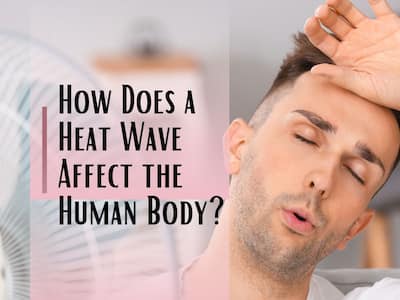
What happens to your body when you expose it to the extreme hot temperature? Scroll down to read and know everything.
The India Meteorological Department (IMD) has issued a heatwave alert in India. According to the reports, some parts of the country are expected to face the wrath of high and scorching heat. At this point, experts have cautioned everyone to take proper care of their bodies, as these heatwaves can damage the body severely from the inside, leading to the onset of chronic health conditions.
From acute dehydration to stroke, bodies exposed to heatwave can get damaged to a level where it can become extremely difficult for the person to survive the condition. We spoke to Dr Anant Katkar, Neurosurgeon Consultant DNB, MS, MBBS, Ruby Hall Clinic, Pune, to understand the various ways in which the body gets affected when it gets exposed to extremely high temperatures.
What Is A Heatwave?
Some people might like it hot, but not everyone knows how extreme heat can overpower the human body. In this article, we explore the possible things that the body may face when it is exposed to high temperatures. But before we dig out the harsh effects of high temperatures on the human body, let us clear the air around heat waves.
What exactly is a heatwave? Heat waves occur when the temperature rises by 4 degrees Celsius over the yearly normal and last for three days or more.
- If the place is near the coast, the temperature is above 37 degrees Celsius.
- The hilly area was hotter than 30 C.
What Happens To The Body During Heatwave?
Now that we know what heat waves are, let’s take a look at how the body reacts to such extreme weather conditions during the summer. What kind of impact does extreme, sustained heat have on the human body? According to Dr Katkar, when a person is exposed to heat waves (extremely high temperatures during the summer season) for a very long time, the first thing that happens is the shutting down of the body’s ability to sweat. What happens when the body is not able to sweat properly? When perspiration is dried by the air there is a cooling effect on the body. Once a person stops perspiring, in very short order a person can move from heat exhaustion to heat stroke.
When the body stops sweating, it becomes very hot from the inside. This is the time when the boy gets affected the most as eventually this leads to a condition where the brain starts getting affected, and that’s when people begin to get confused and can lose consciousness.
READ RELATED: The 10 Best Butter Substitutes To Use When You're in a Pinch
Increased Health Risks Posed By Blackouts
Blackouts can cause severe health issues including — Hypotension, hypoglycemia, as well as dehydration-related fainting attacks. To understand the causes of blackouts triggered by hot temperatures, we spoke to Dr Anant Katkar.
“Some of the causes of heatwave blackout include high body temperature, sweating, low blood pressure, and loose stools or vomiting. It can also get triggered when the person is consuming extremely little amount of food, which can result in hypoglycemia and dizziness,” said Dr Katkar.
- Sudden bleeding brought on by accidents or injuries
- Extreme pain
- Prolonged lying down – Eye protection with goggles – Body sponging with cold water – Consume ORS beverages
- Transfer the patient to the hospital if he experiences blackouts. I/V fluids should be administered until the patient produces urine.
The hypothalamus regulates body temperature. It releases a hormone that aids in regulating and altering the body’s temperature.
The body requires more water as a result of increased perspiration and blood vessel dilation caused by rising temperatures. The first sign of a heatwave or blackout is dry mouth.
- Reduced urine production – Fainting
- Elevated core temperature
- Convulsion
Disclaimer: This content including advice provides generic information only. It is in no way a substitute for a qualified medical opinion. Always consult a specialist or your own doctor for more information.
Total Wellness is now just a click away.
Follow us on
window.addEventListener(‘load’, (event) => {
// $(document).ready(function(){
$(‘#commentbtn’).on(“click”,function(){
(function(d, s, id) { var js, fjs = d.getElementsByTagName(s)[0]; if (d.getElementById(id)) return; js = d.createElement(s); js.id = id; js.src = “//connect.facebook.net/en_US/sdk.js#xfbml=1&version=v2.3”; fjs.parentNode.insertBefore(js, fjs);}(document, ‘script’, ‘facebook-jssdk’));
$(“.cmntbox”).toggle();
});
// });
});







